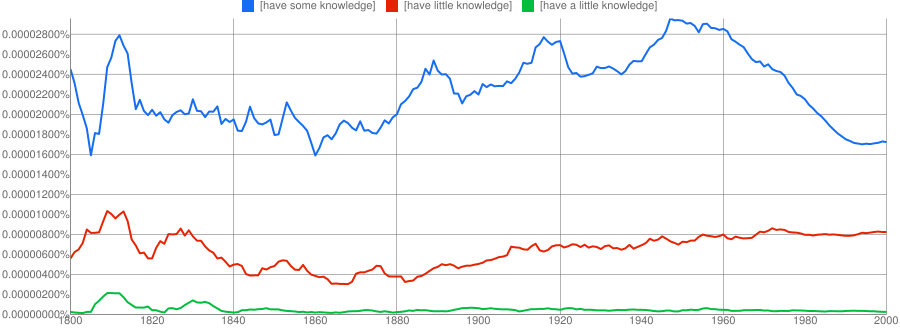First of all in English, we don't normally say we know some knowledge. Instead it is far more common to say that "we have some knowledge" in a particular field or subject.
Google Ngram illustrates that the expression know some knowledge is non existent-existent compared to have some/little knowledge (blue line) and have little knowledge (red line), while have a little knowledge (green line) is used infrequently.
To haveIf a person has some knowledge it implies that wethey have reached a certain level of understanding, but wethey don't feel confident enough to say they are still far from calling ourselves knowledgeable. WeThey have progressed beyond being totally ignorant and we are able to understand some (non specifiedan unspecified amount) if not most of of the technical terms and jargon connected to the subject. For example,
- I have some knowledge of the history of art
- He has some knowledge of computers
MoreHowever, more often than not, we will say
- I know something about about the history of art
- He knows something about about computers.
NowOccasionally, sometimes whenif people say they have some knowledge, they could in actual fact be very well-read, and be very knowledgeable in that field. You might call this false modesty, or, if the person is genuinely nice, humbleness. The fact remains, that person might be veryextremely knowledgeable about thatthe subject, but prefers to keep a low profile. Only by speaking directly to thisthe person will tell you understand if he or she has a smattering of learningthe subject or a full understanding.
To have a little knowledge can have a very similar meaning to some
- I have a little knowledge of the history of art (I don't know much, but I do know something.)
- He has a little knowledge of computers (idem)
whereas little used alone, means a very small quantity
- I have little knowledge of ...
- He has little knowledge of ...
From The Free Dictionary
little, a little
3. used in front of nouns
You use a little to show that you are talking about a small quantity or amount of something. When you use little without 'a', you are emphasizing that there is only a small quantity or amount of something.
So, for example, if you say 'I have a little money', you are saying that you have some money. However, if you say 'I have little money', you mean that you do not have enough money.
- I had made a little progress.
- It is clear that little progress was made.
Collins COBUILD English Usage

